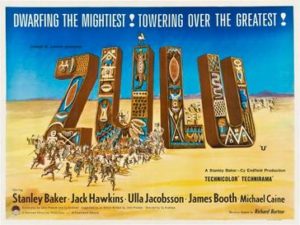When choosing a dissertation topic it is fundamentally crucial to choose one which you find not only interesting, but enjoyable to examine. For instance, I thought about what I absolutely loved at A-level which was my coursework on the beginning of the First World War. I knew that it intrigued me like nothing else and I knew I could read and read until weariness set in. However, this changed after a lecturer cautioned me against such a vast topic because of the risk of becoming bogged down in the sheer volume of sources. So, I had a rethink and asked myself, what got me interested in History? This was easy: the 1964 film Zulu starring a young (and posh!) Sir Michael Caine. From this I decided to explore the battle it depicts, that of Rorke’s Drift in the 1879 Anglo-Zulu War. But I found the sources to be a little repetitive. You see, there is little argument with Rorke’s Drift. We know why it happened and we know roughly why the British won. Therefore, I took a step back and, based on the more diverse and argumentative secondary reading, decided to focus on the Battle of Isandlwana which was still part of the Anglo-Zulu War story and piqued my interest. You’ll know when you discover the topic you want to write about because a sort of cooling of pressure will arrive over you and you’ll realise that you can discuss this for months on end.

Choosing a topic can only come about through conversation and thought, either with yourself or others. With this in mind, it is worth speaking to your personal tutor or a lecturer with whom you are familiar and can have a frank chinwag about where you’d want to go.
The research process is not as overwhelming as it may appear. At the start, it is important to read around the topic. This is because the context and background to it is just as vital as the detailed foreground as it will allow you to place yourself within the topic’s historiography and the actual history itself. If for instance, you chose to focus on Elizabeth I, it would be disadvantageous not to have read a book about the Tudors. (See lecturers and reading lists of modules to help with which books to choose) Furthermore, reading around your topic, enables you to appreciate and understand the principal characters. This early reading also gives you breathing space to truly decide if the topic is what you want to study. If the context seems dull, it may be that the specificity of the detailed story will be more so.
As with essays, the best thing you can do is just to start writing. (In the beginning was the Word is a good lesson with this!) Even if it’s merely scribbled notes where the argument or paragraphs are loosely framed, it is vital that the ideas do not just sit festering in your mind without any escape. I find that if I haven’t written anything in a while, the ideas come out too incoherently and I become swamped. Slow and steady!
It is worth pointing out that the reading will take a long time so use the Summer to really delve into the literature – I wish I had! At times it will seem overwhelming, especially when the clear line of sight through the writing to the conclusion is shrouded in the fog of reading or other pressures, but here I think it is wise to remember what a friend once told me: progress isn’t linear.
Thanks to Jack Gunn!
